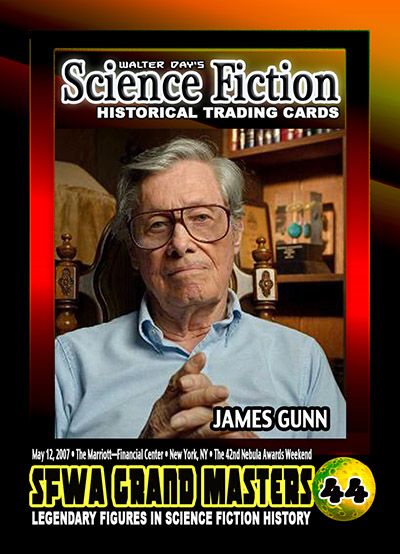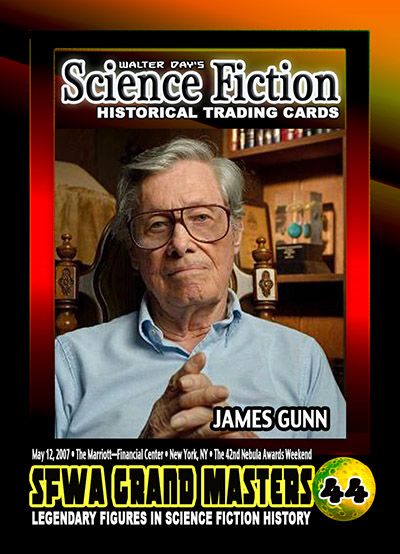- Home
- Articles
- Trading Card Spotlight
- Science Fiction Trading Card Spotlight - James Gunn
Science Fiction Trading Card Spotlight - James Gunn
Our next Science Fiction Trading Card Spotlight Features James Gunn who is displayed on card number 44, from the Science Fiction Collection. Jim, who is a science fiction writer with many awards to his name. Awards that include the Pilgrim award in 1976, SFWA Grand Master Award in 2007, along with being inducted into the Science Fiction Hall of Fame in 2015. Jim also received an award for the book “ALTERNATE WORLDS: THE ILLUSTRATED HISTORY OF SCIENCE FICTION”, from the 1976 WorldCon before WorldCons began awarding Hugos to non-fiction. An updated edition of ALTERNATE WORLDS is scheduled for publication next spring. His teaching has produced several generations of writers and teachers. Jim is retired as a Professor of English at the University of Kansas, where he earned two degrees in 1947 and 1951. Jim’s autobiography, “STAR-BEGOTTEN”, was published a couple of months ago. The third volume of his TRANSCENDENTAL trilogy, TRANSFORMATION, was published in June.
What does it take to be a professional writer today?
What it has always taken—a love of language, stories that demand to be told, determination to get it right and then get it published, and a burning desire to keep improving. I used to tell students that the first thing a writer has to learn is who he or she is and then how to put that knowledge, that unique perception of the world into stories that only the author can write. If the writer can do that he or she will be published. If their unique vision of the world happens to appeal to enough readers, they may even be successful.
How has writing today changed from when you were younger? What do you like or dislike about the changes?
It has become far more a job and far less a labor of love. That applies to science fiction, too. The more popular it is, and the more money is available, the more the work is aimed at pleasing people in profitable ways. Success can be a problem.
Did you ever think when you were younger you would be on a trading card?
It never crossed my mind—or my imagination.
When did you first meet Walter day and where was it at?
We had some correspondence, but our first meeting was at MidAmeriCon.
If you could describe Walter Day in one word, what would that word be and why?
Dedicated. To do what he has done out of love for science fiction is out of this world.
How early in your life did you know you would be a writer?
Pretty early. I wrote a poem when I was in kindergarten and my father (a printer) had it printed on a card. That got me started thinking about publication. The next stage was when my parents got me a used portable typewriter when I was 12 or 13. That was transformative.
Alternate Worlds: The Illustrated History of Science Fiction
If you did not become a writer, what would you be doing?
A teacher (although I am that, too). An editor (I was that). Maybe a copywriter. But I can’t imagine an occupation that wasn’t involved with words.
Are you still involved with writing today, and what role do you play?
I’m still writing—non-fiction at the moment, but I have a story idea or two. I’m still doing some teaching and advising younger writers.
What are your favorite type of books and why?
I’ve gone through stages when I read historical novels, detective novels, science books, but I always came back to science fiction and, occasionally, fantasy. They offered soaring avenues of imagination into unknown lands.
How has your involvement in the writing profession been important to you?
It’s what gets me up in the morning and keeps me going through the day. Whenever I had the time—even during the school year—I was always working on something or thinking about writing something. It’s been the center of my life.
What do you think about electronic books that you can download versus the actual physical hard copy?
It can be a great opportunity for writers who have the particular skills to make it work for them. I grew up in a different era, and I fell in love with the printed word, so I like the look of it and the feeling that someone somewhere liked it enough to put it into print and pay me for it. And it will last until the paper falls apart.
What authors do you admire today and who did you look up to as a child?
My heroes were the authors of my youth. There is a saying that the golden age of science fiction is twelve. I fell in love with science fiction and fantasy with authors like Edgar Rice Burroughs and A. Merritt, moved on (or back) to Jules Verne and H. G. Wells and then forward once more to Jack Williamson, Clifford Simak, Isaac Asimov, Robert Heinlein, Theodore Sturgeon, and A. E. van Vogt. The last twenty years or so have seen the emergence of a great many talented writers, and I salute their accomplishments, but they cannot compare with the icons of my youth.
Who is your favorite celebrity and what makes that person special?
I think President Obama did a remarkable job in a sane and sensible way under great difficulties.
Did you play Video games growing up and what were some of your favorites?
There were no video games when I was growing up. No video either. We played simple board games like Monopoly when we weren’t out playing baseball.
If you could own one arcade game or pinball game, what would it be and why?
I used to like pinball, but I couldn’t describe anything particular.
What are your favorite books past and present?
I taught twenty-five novels in my science-fiction class; they may not have been my favorites, but they represented the books that I thought had played a meaningful role in the development of today’s science fiction. You can look up the list on the Center for the Study of Science Fiction website. Or the list I put together called the “Basic Science Fiction Library.”
Star-Begotten: A Life Lived in Science Fiction
Transformation: A novel (TheTranscendental Machine)





